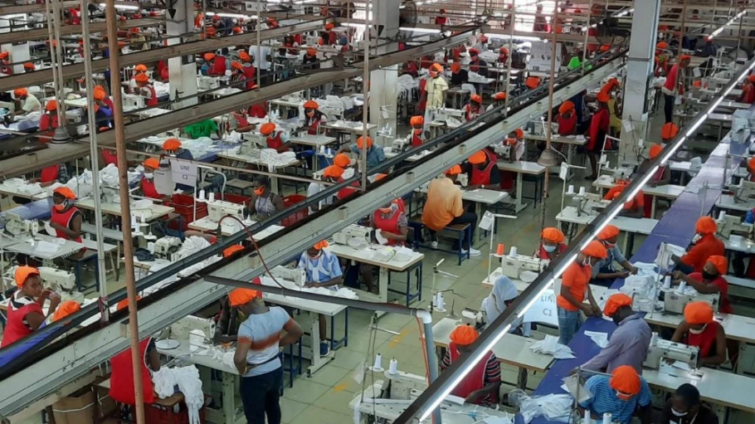The Ghana Statistical Service (GSS) has released the first edition of the National Report on Productivity, Employment, and Growth. According to the report, labour productivity grew faster than technology-based changes in output.
The report shows statistics on labour and total productivity trends from 1991 to 2022.
It highlights how available statistics can be used to measure productivity and guide economic development in Ghana.
Speaking at the launch, the Government Statistician, Professor. Samuel Kobina Annim stated “We are gathered here in pursuance of the new focus that we have adopted as a Service. And this new focus has to do with not presenting statistical outputs but presenting statistics in a manner that is policy relevant. What we are doing today is focusing on three key areas: productivity, employment, and economic growth.”
He further explained, “Labour productivity measures how efficiently workers produce goods and services over a specific period. Total productivity measures how efficiently multiple inputs, like labour, capital, and materials, are used together to produce output and drive growth.”
The report indicates that Ghana has achieved a moderate level of labour productivity growth, with accelerated growth between 2010 and 2016 following the beginning of the extraction of oil. The country recorded annual labour productivity that is higher than the average for lower – middle income countries but lower than that of a higher middle income country. However, the overall impact on total productivity has been limited, as growth has been concentrated in a few sectors, such as mining, rather than spreading across the broader economy.
A closer look at sectoral trends reveals significant variations. While productivity has increased in areas such as household agriculture and trade, these sectors have also seen job losses, as workers move into lower-productivity roles in construction and urban services. The mining sector has achieved high productivity growth but has not generated substantial job opportunities. In contrast, commercial agriculture, manufacturing, transportation, and utilities have recorded both productivity gains and job creation.
This highlights the need for investment in other sub-sectors than can generate productivity, decent employment growth and technological modernisation. The report concludes by highlighting the key sectors requiring intensified investments in labour and capital due to their contribution to both economic growth and employment creation over the period. These include commercial agriculture, transportation and utilities, and manufacturing.
The findings further reveal that average earnings in Ghana have increased at a slower pace than productivity growth, and the gap is widening over time. Sub-sectors with the highest earnings growth relative to productivity include utilities, construction, and tourism. Earnings growth has been slower relative to productivity in the more informal sector such as household agriculture, and trade and repair services.
The event featured a series of presentations and an engaging panel discussion where key stakeholders shared their insights. Participants also actively contributed to the dialogue by offering diverse perspectives on the report’s findings. Partners at the launch commended the Government Statistician for transforming the Ghana Statistical Service, acknowledging his efforts in making statistics and data readily available to stakeholders, ensuring that policymakers have access to the necessary information to drive informed decision-making and national development.
By publishing this report, the GSS and its partners aim to encourage discourse and deepen understanding of productivity trends that will support policymakers and businesses make informed decisions. The findings presented can support develop strategies to improve efficiency; set performance targets; make informed decisions about wages, inputs, investments and resource allocation; and identify opportunities for innovation and improvement.
Latest Stories
-
NFFA elects Michael Kwetey Tetteh as its president
3 minutes -
NPP outlines guidelines ahead of 2025 National Delegates Conference
11 minutes -
Ken Ofori-Atta’s extradition: FBI clears first major hurdle – No witch-hunt
23 minutes -
NDC executives deny involvement in rogue anti-galamsey taskforce
1 hour -
Bailiff jailed four years for forging judge’s signature
2 hours -
Presidency launches gov’t accountability series to enhance transparency
3 hours -
2024 Election: Bawumia’s early concession undermined results collation – Inusah Fuseini
3 hours -
Judge orders Trump administration to stop immigration arrests without probable cause in Southern California
3 hours -
What Ghana Must Fix: ISSER’s GSDO 2024 report exposes key social gaps in housing, jobs, and governance
4 hours -
“I want to help with ideas” – Socrate Safo to creatives in government
4 hours -
Prof. Nana Ama Browne Klutse: Championing environmental sustainability and youth employment in Ghana
6 hours -
Ablekuma North rerun: ‘I was only there to de-escalate the situation’ – Mustapha Gbande
6 hours -
I was once a footballer – Socrate Safo reveals
6 hours -
See the blackout areas as ECG’s planned maintenance proceeds today
8 hours -
Democracy advocacy group condemns Ablekuma North violence
8 hours

